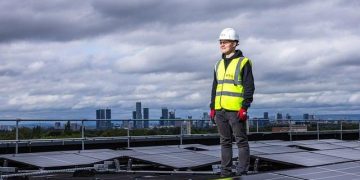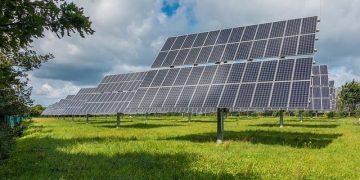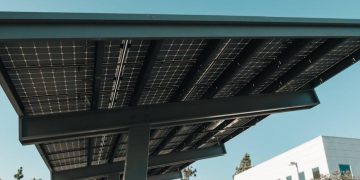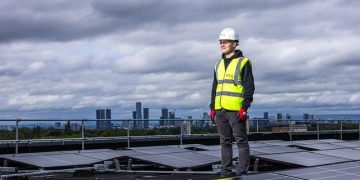In the sprawling tapestry of our global community, the sun shines indiscriminately, casting its golden glow on both the affluent skyscrapers of New York and the humble villages of sub-Saharan Africa. Yet, while the potential for solar energy is universally abundant, the means to harness it are not. This disparity brings us to a pivotal question: should developed nations, basking in their economic prowess, shoulder the financial responsibility of facilitating solar adoption in less fortunate countries? As the world grapples with the escalating urgency of climate change, this debate emerges not only as a matter of environmental stewardship but also as a reflection of global equity and shared responsibility. In this exploration, we delve into the multifaceted arguments surrounding this issue, weighing the ethical, economic, and environmental implications of such a collaborative endeavor.
Evaluating the Moral Imperative of Solar Investment
Investing in solar energy in developing countries raises profound ethical questions. On one hand, the environmental impact of fossil fuels and the urgent need for sustainable energy sources call for immediate action. Developed nations, with their historical responsibility for a large portion of global carbon emissions, may indeed have a moral obligation to support solar initiatives in poorer regions. This could be seen as a form of climate justice, addressing past inequalities by enabling these nations to leapfrog into a sustainable future.
- Historical Responsibility: Developed nations have contributed significantly to climate change and could therefore be seen as bearing the responsibility to mitigate its impacts globally.
- Resource Allocation: Wealthier countries possess the financial means and technological expertise to spearhead solar projects in regions where they are most needed.
- Global Benefits: Reducing global carbon emissions benefits everyone, creating a more stable and sustainable planet for future generations.
Conversely, some argue that imposing such responsibilities on developed countries may overlook the need for developing nations to cultivate their own sustainable growth paths. There is a delicate balance between providing necessary support and fostering dependency, which must be navigated with care. Ultimately, the ethical landscape of solar investment requires a nuanced approach, blending responsibility with empowerment.

Economic Impacts and Opportunities for Global Growth
The global shift towards renewable energy is not just an environmental necessity but also an economic opportunity. Investing in solar energy in developing nations could stimulate local economies, creating jobs and reducing energy costs, which are often disproportionately high in these regions. For developed countries, financing these solar projects could open new markets for their technologies and expertise, fostering international partnerships and trade.
Moreover, supporting solar adoption can lead to a more stable global economy by reducing energy dependency and mitigating the impacts of climate change, which often hit the poorest nations hardest. The economic benefits are not limited to the immediate job creation and reduced energy costs but also include long-term growth opportunities. These opportunities are characterized by:
- Increased energy security and independence for developing countries.
- Diversification of energy sources reducing reliance on fossil fuels.
- Enhanced global collaboration on sustainable technologies.
- Improved quality of life for communities through better access to energy.
This holistic approach to energy development could pave the way for a more equitable and sustainable global economy.

Technological Transfer and Infrastructure Development
The process of sharing cutting-edge technology across borders is essential for fostering global equality. Solar energy, with its potential to alleviate energy poverty and combat climate change, stands at the forefront of this exchange. However, transferring solar technology from developed to developing nations involves more than just the physical relocation of solar panels. It requires substantial infrastructure development to ensure effective deployment and sustainability. Developing nations often face challenges such as:
- Lack of skilled labor to install and maintain solar systems
- Inadequate grid infrastructure to integrate solar energy
- Limited access to financing for large-scale solar projects
Addressing these hurdles calls for a collaborative effort where developed nations could play a pivotal role. They possess the technical expertise and financial resources needed to build robust infrastructure, thereby empowering poorer countries to harness solar power effectively. Such support could be framed as part of a broader strategy for technological transfer, ensuring that the global transition to renewable energy is inclusive and equitable.

Crafting Effective Policies for Equitable Energy Solutions
The idea of developed nations financing solar adoption in less affluent regions is a compelling proposition that intertwines economic responsibility with environmental stewardship. The energy divide is stark, with wealthier countries often reaping the benefits of advanced renewable technologies, while developing nations struggle with access and affordability. Should affluent countries bear the cost of solar infrastructure abroad? This question opens a debate that is as complex as it is crucial. On one hand, the ethical responsibility stemming from historic emissions and the disproportionate impact of climate change on poorer nations suggests that wealthier states should indeed contribute. On the other, the economic burden and political intricacies involved pose significant challenges that require careful consideration.
- Economic Viability: Investing in solar projects can stimulate local economies, creating jobs and fostering sustainable growth.
- Environmental Impact: By supporting solar adoption, developed nations can help mitigate global carbon emissions and combat climate change.
- Technological Exchange: Such initiatives can foster technology transfer and innovation, paving the way for future advancements.
However, these efforts must be paired with robust policies ensuring that funds are used effectively and equitably, avoiding neo-colonial pitfalls. It’s essential to engage local communities in decision-making processes, ensuring that the transition to renewable energy is both inclusive and empowering. The question remains: can the global community come together to craft policies that balance these dynamics, achieving a sustainable and equitable energy future for all?
To Conclude
As the sun sets on our exploration of whether developed nations should finance solar adoption in poorer countries, the horizon remains both complex and promising. This global dialogue, illuminated by the twin beacons of responsibility and opportunity, continues to evolve. We stand at a crossroads where the shadows of inequality meet the dawn of sustainable possibilities. While the answers may not be clear-cut, the potential for collaboration offers a path toward a brighter, more equitable future. As we navigate this intricate landscape, let us remain committed to fostering dialogue, understanding diverse perspectives, and working together to harness the boundless energy of the sun for all.


































